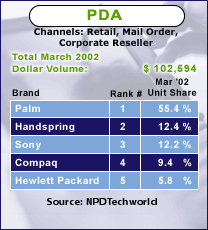 |
|
|
|
May 2002: The sale figures for March 2002 are in, and it appears that all the "rumours of Palm's demise have been greatly exaggerated". ``The buzz has been that there's a lot of momentum for Microsoft in the corporate marketplace right now,'' said Steve Baker, analyst at NPD Techworld, a market research firm. ``But the sales numbers that we're seeing don't support that.''
The conventional wisdom in the IT industry says; "that if you stand in Microsoft's way you'll get run over". In fact last year many industry pundits were ready to to declare Microsoft king of the hill again, but the anticipated sales of Pocket PC devices have just not materialized. So what happened? Well, it may be true that Microsoft does rule the roost on the desk top, but as they, and most everyone else in the IT biz, have discovered the mobile market place is "Terra Incognita", and here there be dragons. The mobile market is a very different environment, with very different requirements. What seems to work well on the desk top will not necessarily "port over" well to the constrained requirements of the mobile platform. Power conservation, usability and screen real estate all play a role. Microsoft's big mistake was to take a operating system designed for the desk top and attempt to shoe horn it into to a tiny gadget not much bigger than a deck of cards. In fact it took Microsoft 3 attempts to come up with something that was even modestly "mobile friendly". "It's the difference between taking technology derived from
a PC and making it more energy efficient, and something that's
designed from scratch to treat power as a scarce resource,"
said Kyle Harper, business manager for Motorola's Wireless and
Baseband Systems Group. "There's a lot you can do when you
don't have a huge operating system footprint to deal with."
The one bright spot for the Pocket PC platform has been the Compaq iPaq (now the HP iPaq). Over the last two years iPaq has enjoyed a respectable increase in sales. "With the introduction of the iPaq we went from basically zero up to about 10 percent market share worldwide,'' said Rich Paxton, Hewlett-Packard's iPaq product manager for North America. The iPaq was the great hope of Microsoft, and it was seen as the doorway to the enterprise sales. "However, events have conspired to slow the Pocket PC's momentum. First, the economic slowdown. While recession hurt everybody in the PDA market, including Palm, a renewed focus on value (particularly from enterprise buyers) favored Palm's lower-cost devices." Says Carl Zetie, VP of Giga Information Group. "Second, the HP-Compaq merger. Between them, Hewlett-Packard and Compaq account for the lion's share of Pocket PC sales, especially in the enterprise" said Zetie. Now that HP has officially discontinued the Jornada line up in favor of the more popular iPaq, it remains to be seen if the loyal Jornada users can be converted to iPaq fans. So with events seemingly favoring the Palm OS, are we ready to declare a winner in the mobile space? Absolutely not! It would be as much folly to to declare Microsoft dead as it was for the IT industry's "cognoscenti" to start writing Palm's obituary. What the current sales figures do tell us is: Microsoft may be still a long way from making it to first base, but they do have a strong team and the games have just begun. Related article: Palm Delivers Lower TCO to Enterprises
|
||||||

